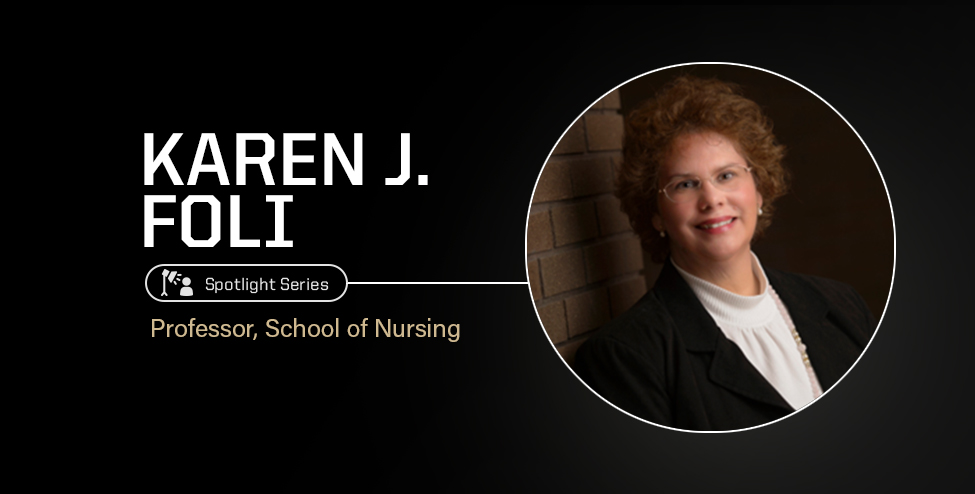Increasing Awareness of the Mental Health Needs of Nontraditional Families: Karen J. Foli

Karen J. Foli is internationally recognized for her empirical and engagement work in parental postadoption depression.
Karen J. Foli, a professor in the School of Nursing, has been instrumental in conducting research and de-stigmatizing conversations around nontraditional families, which include adoptive, foster, and kinship parents, and the challenges they face after the child is home. Through her engagement, she has helped others gain a better understanding of the mental health issues experienced by these parents. With knowledge acquired from Foli’s research, nurses, as well as adoption professionals, can apply best practices to serve those who need it.
Foli, an adoptive mother, had an interest in nontraditional families even before arriving at Purdue University. When she began her research on depressive symptoms of adoptive parents, the information was scarce and considered highly stigmatized. Her research examined how people entering the adoption process often placed high expectations on themselves and/or their children. Mental models of perfection and unrealistic expectations may form in the minds of parents caring for children. Such high expectations are often met with a reality that results in unmet expectations, which Foli has found are associated with depressive symptoms. Foli has created and tested a theory of parental postadoption depression (PAD) that aims to strengthen families by increasing awareness of PAD.
Aside from several studies with adoptive parents, and with funding from the National Institute of Food and Agriculture, Foli conducted a pilot study in rural Indiana that focused on trauma-informed parenting for kinship and foster families. These kinship and foster parents often assumed the care of children whose parents were experiencing alcohol and opioid use and were unable to care for their children. Grandparents of the children struggled with the shame and stigma that surround the issue of substance use, as well as how to care for the children who had often experienced maltreatment. With the help of a curriculum provided through the National Child Traumatic Stress Network, which translated into 16-hour parenting classes, positive behavioral changes among the participants were realized.
“It was extremely gratifying to know that many of the grandparents changed their understanding of their parenting behaviors and their children’s behaviors, born from trauma,” said Foli.
Over the past four years, Foli has been working with a sub-team of the American Academy of Nursing Child, Adolescent, and Family Expert Panel to publish work on foster and kinship families. The work being done, in collaboration with nursing faculty from Johns Hopkins, the University of Wisconsin-Milwaukee, and the University of California-Fullerton, is to educate nurses on adoption and nontraditional families. Foli explains that nursing curriculums around adoption and nontraditional families is lacking and that through this work, the team is filling the gap in subjects such as nursing care related to nontraditional families and youth aging out of foster care.
Recently, a pediatrician, with 23 years of experience working with children in “State care” and with the National Health Service in the United Kingdom, contacted Foli. Regarding PAD, she stated that Foli’s work had “enabled professionals and adoptive parents alike to be able to address the factors involved and to seek professional mental health treatment if needed.” Foli attributes such impact as the result of over 20 years of research, publication and dissemination at conferences, with broad audiences, from front line workers and parents to scholars reading peer-reviewed publications.
The way Foli puts it, there is a continuum regarding engagement. Some engagement is more apparent, like “direct community work,” but it can also occur in other ways, such as “disseminating work or interfacing with groups that need the information.”
More information on Foli can be viewed here.